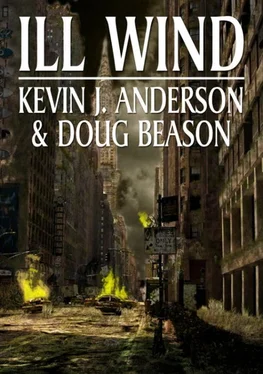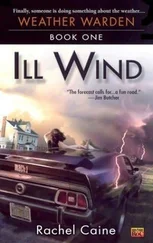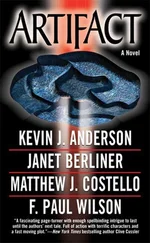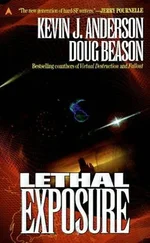He considered waiting until morning and getting off to a fresh start. But that didn’t feel right—he could travel through the afternoon, into the night, keep away from people or traffic.
Besides, he had always wanted to ride off into the sunset.
Jackson Harris sat across from his wife Daphne at an old Formica dinette table in the kitchen, trying to digest the phone conversation he’d just had. Sure, it would be easy to just pack up a few things and run out to Altamont and stay with Doog—but then what would they do? Harris and his wife had obligations to their group of people, the kids they had taken to state parks, the volunteer army that had worked so hard on Angel Island, Daphne’s church group, his own inner-city cleanup work. He couldn’t just abandon all that.
Running away didn’t seem feasible. He looked at Daphne. She had pulled her frizzy hair back with a blue hairband, and her strain-tightened face looked more angular in the uncertain light.
He could still taste the onions and spices from the quick meal of canned vegetarian chili he had warmed in an old pan on the gas stove. They had about a week’s worth of canned soup, beans, and vegetables in the pantry. Many of the grocery stores had already been looted.
“We can’t stay here, Daph,” he mumbled. “No way.” Overhead, the lights flickered, then stayed on.
“All right,” said Daphne, straightening up and managing the no-nonsense expression she did so well. “But how we gonna keep ourselves afloat and help as many folks as we can?”
All afternoon, he and Daphne had taken turns attempting to make calls from the phone hanging on the kitchen wall, begging favors, trying to borrow supplies, but panic and confusion had spread faster than the plague. Phone service was intermittent, and it probably wouldn’t last much longer. The city of Oakland had started to break down, not just automobiles, but random items made of plastic. Though the plastic-eating phase had not yet struck their home, the Harris’s own battered Pinto had not coughed to life for days, and their neighbors were similarly trapped.
It could only get worse.
The BART trains had stopped running, and the bus system ground to a halt. Traffic on the streets was less than a third of what he was used to seeingl; a few vehicles still managed to chug along, but they would probably succumb to the petroplague before long. Police cars, ambulances, and fire trucks couldn’t respond to emergency calls.
Harris rapped an old pencil on the side of the table in a nervous, sporadic drumbeat. “We can round up some people and head out to the Altamont commune. Doog won’t mind so long as we work.”
Daphne snorted. “Doog and work don’t belong in the same sentence!” She had no quarrel with Doog’s politics, but Daphne resented him for not sticking with the battle in the inner city.
Doog and a group of aging hippies had fled into the isolated hills between Livermore and Tracy years ago when they saw their John-Lennon world fading into yuppie-dom. When “liberal” became a dirty word, Doog had just shaken his head at Harris. “Man,” he said, “has the world gone off the deep end, or what?”
Harris flipped the pencil down on the table and met Daphne’s gaze. “Doog is doing just fine out there, Daph. He’s only 40 miles away. He’s got the aqueduct for water and windmills for power. They grow most of their own food. They’ve been living off the land for years. You got a better place in mind?”
Daphne shrugged. Sweat glistened on her cheeks. She had not put on makeup that morning, but Harris didn’t think she had ever looked more beautiful. “Okay, it’s a good enough spot to hide out for a while. I got no desire to be here to defend our home when the mob comes through.”
Harris grabbed her hand and squeezed. “This is going to be a hell of a lot worse than the Rodney King riots. It’s not just a public temper tantrum. People are going to be starving before long, and they won’t have soup kitchens. Come winter, they’ll chop up anything that burns just to stay warm. If we want to save any of our people, we got to go someplace else, and soon.”
“Rats leaving a sinking ship,” Daphne muttered.
“Pilgrims heading for the promised land,” he corrected.
* * *
Three buses sat in different states of decrepitude in the parking lot of the Holy Grace Baptist Church. Rusted cans and junk-food wrappers littered the chain-link fence against the red-brick church building. Two basketball hoops sat unused on either end of the lot; it had been years since a chain-net had graced either hoop, and the painted court lines had long since worn off the pavement. Despite the security fence, gang graffiti was spray-painted in black and bright blue on the sides of the buses.
The Reverend Timothy Rudge handed Daphne Harris the keys to the vehicles. He was a stocky man with strange spindly arms and legs, dressed in worn jeans and a maroon sweatshirt. He pursed his full lips. “I haven’t gone anywhere for days. They might not work, you know.”
“They probably won’t,” Daphne said, clutching the keys. “But one of them just might, and we only need one. That plague is spreading, but it can’t eat everything at once. We might get lucky.” She paused and looked at his face, weatherbeaten from years of preaching on the streets. “Sure you won’t come along?”
He shook his head. “Somebody has to stay behind. Might as well be me. You and Jackson been working with these people on your wilderness experience programs. You know what they can do if they let themselves believe in it. They deserve a chance.”
Reverend Rudge turned wearily and watched Jackson sweating as he pulled another load of blankets and supplies from the church shelter. Daphne rattled the keys in her hand. “What about you, Reverend? If things get bad—”
“When things get bad around here, we’ll call the congregation to the church. Make a stand.”
“You’ll never be able to protect yourselves,” Daphne said, a lump in her throat.
“We can try. We just may be able to keep an island of stability here downtown. Have faith.”
“I hope so,” she said, knowing as she spoke that her words were false. From the reverend’s fatalistic expression, she knew he understood it too. She turned away, unable to look at him any longer.
She went to the newest of the three buses and climbed into the bucket seat. Daphne had driven this bus often when they took their volunteer groups. She tensed in a combination of hope and dread as she jingled through the key ring to find the proper key. Her fingers were slick with sweat as she jammed the key into the ignition and twisted hard, as if to show the vehicle who was boss.
But the engine refused to turn over. She tried four times, without success. Jackson stood in the parking lot, watching her. He shrugged and pointed to the next vehicle. Sighing, Daphne climbed out and went to the second bus, an older model with two broken windows.
Jackson continued to haul supplies for the trip. Volunteers from the Harris’s recent crusades gathered in the church, people who were willing to work for a cause, people who didn’t have anything else to lose in their daily lives. Of course, if none of the buses started, the whole expedition would never happen. Daphne couldn’t allow herself to admit that possibility.
The second bus protested, but Daphne gritted her teeth and kept grinding the starter. The engine finally coughed to life and rumbled like a tiger with a stomach ache. Blue-black diesel exhaust, already smelling foul from the first attacks of the petroplague, spat out the rear. She raised her fist in the air, and Jackson set down his paper grocery bags on the pavement and mirrored the gesture.
Читать дальше












